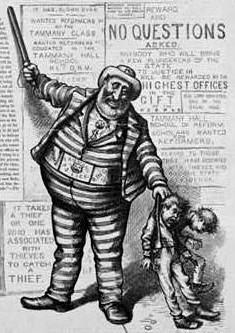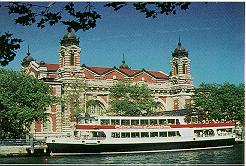Posted by GET NY on 07:15:54 12/23/04
Former Attorney Loses Appeal Of Conviction for Illegal Voting
New York Law Journal
June 15, 2001
BY JOHN CAHER
ALBANY - By a 5-2 vote yesterday, the Court of Appeals apparently made John Kennedy O'Hara the first New Yorker since suffragette Susan B. Anthony to stand convicted of illegal voting and false registration.
On Monday, the former attorney - who was disbarred following his conviction for voting from a residence where he had stayed for a time, but that was not his permanent home - is due back in court. Mr. O'Hara, who is unemployed, owes more than $20,000 in fines and about 1,000 hours of community service. Since he has no money and no job, Mr. O'Hara said he expects to go to prison.
"When the country starts locking people up for voting, you just have to stop and take notice," a dejected Mr. O'Hara said yesterday I can't believe the Court of Appeals would stand for this ... . I am wiped out - disbarred, chain-ganged, confined by probation for 15 months, and all because I registered to vote."
Yesterday's ruling in People v. O'Hara, 78, caps five years of effort by the Brooklyn District Attorney that resulted in three trials against a political gadfly and four appeals. It stems from the fact that in 1992 Mr. O'Hara, who has run unsuccessfully for various state and local offices, registered to vote from his ex-girlfriend's apartment on 47th Street in Brooklyn after reapportionment shifted his permanent residence on 61st Street to a different electoral district. Mr. O'Hara voted from the 47th Street residence five times in 1992 and 1993.
Brooklyn District Attorney Charles Hynes pursued criminal charges and obtained an indictment accusing Mr. O'Hara of seven felonies, alleging that the 47th Street apartment was never his legitimate residence. The essence of all the charges was that Mr. O'Hara was not a resident of 47th Street within the meaning of the Election Law, which defines residence as "that place where a person maintains a fixed, permanent and principal home and to which he, wherever temporarily located, always intends to return."
The first trial ended in a conviction that was overturned on appeal. The second concluded with a hung jury. The third resulted in a conviction on all seven counts and, ultimately, an affirmance by the Appellate Division, Second Department, and now the Court of Appeals.
On appeal, Mr. O'Hara, who was represented by Steve S. Efron of Manhattan, relied largely on the Court of Appeals' decision in Ferguson v. McNab, 60 NY2d 598 (1983), where the Court said a "candidate having two residences may choose one to which she has a legitimate, significant and continuing" attachment. Mr. O'Hara maintained that under Ferguson, he maintained two bona fide residences, and was free to choose either as his voting address. He argued that the statute, and the trial court's reliance on it in charging the. jury, essentially deprived him of the opportunity to select between the two apartments.
"I was guilty as charged," Mr. O'Hara acknowledged yesterday. "The question was whether it was the proper charge."
One Question
The five-judge majority, lead by Judge Richard C. Wesley, distilled the case down to one question: Did Mr. O'Hara genuinely take up residence at 553 47th Street?
At trial, an Office of Court Administration employee testified that Mr. O'Hara had listed 47th Street as his address on an attorney registration form. Additionally, Mr. Ohara showed that his American Express billing statements were sent to that address. Neighbors testified that they had seen Mr. O'Hara entering the 47th Street apartment, and his mother and aunt both said he was living at that address. Mr. O'Hara testified that while he lived on 47th Street he maintained the 61st Street apartment as an office and for relatives. He said that after he and his girlfriend broke up, she allowed him to stay in the basement rent free, which he did for a while before returning to 61st Street.
On the other hand, Mr. O'Hara acknowledged that he never changed his driver's license to the 47th Street apartment and continued to use the 61st Street address on his state and federal tax forms. Further, the owner of the 47th Street building testified that the basement had never been a habitable apartment, the 61st Street landlord said Mr. O'Hara was a tenant there, and the telephone company reported that the defendant had telephone service at 61st Street but not 47th Street.
In charging the jury, the trial court defined residence as it is described under Election Law, and advised that a person with two residences may choose either for voting purposes so long as the one chosen comports with the statutory definition.
Mr. O'Hara maintained on appeal that the Election Law definition of "residence" is vague and unconstitutional and that the statue cannot be reconciled with case law. Judge Wesley wrote that the statute clearly defines residence, that the charge was not confusing, and that Election Law andFerguson are not, as Mr. O'Hara and the dissent maintained, irreconcilable.
"Thus, to be a resident of a place, a person must be physically present with the intent to remain for a time," Judge Wesley wrote. He noted that courts have recognized "that in this modern and mobile society" a person can maintain more than one legitimate residence, but said "for the purposes of Election Law, one cannot create an address solely for the purpose of circumventing residency requirements."
Joining the prevailing opinion were Chief Judge Judith S. Kaye and Judges George Bundy Smith, Carmen Beauchamp Ciparick and Victoria A. Graffeo. Judge Albert M. Rosenblatt dissented in an opinion joined by Judge Howard A. Levine.
Dissenting Opinion
Judge Rosenblatt argued that the definition of residence is anything but clear and said the trial judge's charge, which attempted to combine both statutory language and the essence of Ferguson, led to "two facially incompatible formulations of residence" that "should' not be countenanced in a felony prosecution."
The dissent referred to the 1972 decision in Bressler v. Holt-Harris, 37 AD2d 898 and 30 NY2d 529. Bressler involved a prominent Albany lawyer who lived outside the city but wanted to run for a city judgeship. John A. Holt-Harris' law firm maintained for him a studio apartment in the City of Albany where Mr. Holt-Harris recalled eating and sleeping a grand total of once in seven years. In Bressler, the Appellate Division, Third Department, applied the same statute invoked against Mr. O'Hara and found that Mr. Holt-Harris was In compliance. The Court of Appeals affirmed.
Judge Rosenblatt said New York courts have consistently refused to invalidate candidacies based on failure to strictly comply with residency requirements, and expressed misgivings about doing so in a criminal case when the definition of residence is hardly crystal clear.
"If politically-charged disputes such as this and questions of 'residence' are going to be resolved in the criminal arena and decided by juries, with the possibility of criminal conviction and incarceration, we should ensure that the definition of residence is plainly fixed and easily understood," Judge Rosenblatt said.
The prosecution was represented by Assistant District Attorney Monique Ferrell. In a prepared statement, District Attorney Hynes said: "The Court has sent a clear unequivocal message that one cannot defraud the voters of Kings County,"
Mr. O'Hara was supported in amicus curiae briefs filed by the League of Women Voters and the New York Civil Liberties Union.
Similar Charge
Apparently, the last person in New York convicted of a similar charge, although under a different statute, was Ms. Anthony, who was ineligible to vote because of her gender and was prosecuted in 1876. Aside from Mr. O'Hara, the only other person ever criminally charged with failure to establish legal residence within a voting district was Benjamin Ramos, who was prosecuted for using his in-laws' apartment as his legal residence so he could run for the Bronx school board. The indictment against Mr. Ramos was dismissed in 1999 because of a faulty definition of residence - the definition in Election Law - provided to the grand jury.
Mr. O'Hara blamed his unique prosecution on a political vendetta and the fact that he challenged the power structure, perhaps one time too many.
"In essence, I refused to bow to the crown," Mr. O'Hara said. "You just don't stand up to the powers that be and not face consequences."
Kevin Davitt, spokesman for Mr. Hynes, said there was no political agenda behind the prosecution. He said that given Mr. O'Hara's egregious violations - he voted not once but five times from the 47th Street address - "a precedent had to be set."
Mr. O'Hara said he had practiced law for about 10 years in New York City before he was disbarred.
"It [practicing law] seems like a distant memory to me now, and I guess it is going to stay that way," he said.
Follow Ups:





